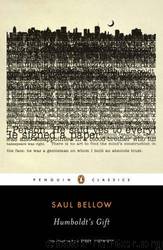Humboldt's Gift (1976 Pulitzer Prize) by Saul Bellow

Author:Saul Bellow
Language: eng
Format: mobi
ISBN: 9780143105473
Publisher: Penguin Classics
Published: 2007-09-24T14:00:00+00:00
When the dear
Disappear
There are others
Waiting near.
I doubt that anyone appreciated Renata’s wit more deeply than I did. It always opened breath-taking perspectives of candor. But Humboldt and I had agreed long ago that I could take anything that was well said. That was true. Renata made me laugh. I was willing to deal later with the terror implicit in her words, the naked perspectives suddenly disclosed. She had for instance also said to me, “Not only are the best things in life free, but you can’t be too free with the best things in life.”
A lover in the lockup gave Renata a classic floozy opportunity for free behavior. Because of my habit of elevating such mean considerations to the theoretical level it will surprise no one that I started to think about the lawlessness of the unconscious and its independence from the rules of conduct. But it was only antinomian, not free. According to Steiner, true freedom lived in pure consciousness. Each microcosm had been separated from the macrocosm. In the arbitrary division between Subject and Object the world had been lost. The zero self sought diversion. It became an actor. This was the situation of the Consciousness Soul as I interpreted it. But there now passed through me a qualm of dissatisfaction with Rudolf Steiner himself. This went back to an uncomfortable passage in Kafka’s Diaries pointed out to me by my friend Durnwald, who felt that I was still capable of doing serious intellectual work and wanted to save me from anthroposophy. Kafka too had been attracted by Steiner’s visions and found the clairvoyant states he described similar to his own, feeling himself on the outer boundaries of the human. He made an appointment with Steiner at the Victoria Hotel on Jungmannstrasse. It is recorded in the Diaries that Steiner was wearing a dusty and spotted Prince Albert and that he had a terrible head cold. His nose ran and he kept working his handkerchief deep into his nostrils with his fingers while Kafka, observing this with disgust, told Steiner that he was an artist stuck in the insurance business. Health and character, he said, prevented him from following a literary career. If he added theosophy to literature and the insurance business, what would become of him? Steiner’s answer is not recorded.
Kafka himself of course was crammed to the top with this same despairing fastidious mocking Consciousness Soul. Poor fellow, the way he stated his case didn’t do him much credit. The man of genius trapped in the insurance business? A very banal complaint, not really much better than a head cold. Humboldt would have agreed. We used to talk about Kafka and I knew his views. But now Kafka and Steiner and Humboldt were together in death where, presently, all the folk in Stronson’s office would join them. Reappearing, perhaps, centuries hence in a more sparkling world. It wouldn’t have to sparkle much to sparkle more than this one. Nevertheless, Kafka’s description of Steiner upset me.
While I was engaged in these reflections, Thaxter had gotten into the act.
Download
This site does not store any files on its server. We only index and link to content provided by other sites. Please contact the content providers to delete copyright contents if any and email us, we'll remove relevant links or contents immediately.
Beautiful Disaster by McGuire Jamie(25332)
Trainspotting by Irvine Welsh(21667)
Call Me by Your Name by André Aciman(20517)
The Secret History by Donna Tartt(19090)
All the Missing Girls by Megan Miranda(16029)
Cat's cradle by Kurt Vonnegut(15356)
Pimp by Iceberg Slim(14508)
Norse Mythology by Gaiman Neil(13365)
The Tidewater Tales by John Barth(12659)
4 3 2 1: A Novel by Paul Auster(12393)
Scorched Eggs by Childs Laura(11353)
The Break by Marian Keyes(9368)
The remains of the day by Kazuo Ishiguro(8999)
Adultolescence by Gabbie Hanna(8927)
Never let me go by Kazuo Ishiguro(8900)
Where the Crawdads Sing by Delia Owens(8626)
All the Light We Cannot See: A Novel by Anthony Doerr(8497)
A Man Called Ove: A Novel by Fredrik Backman(8437)
Circe by Madeline Miller(8142)
